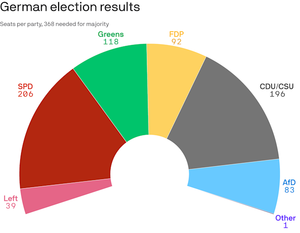Difference between revisions of "2021 German parliamentary election"
m |
m |
||
| Line 4: | Line 4: | ||
|image=German_elections.png | |image=German_elections.png | ||
|image_width=300px | |image_width=300px | ||
| − | |image_caption= | + | |image_caption=The makeup of the new [[Bundestag]] |
|occurred=26 September 2021 | |occurred=26 September 2021 | ||
|description=Possibly the most important [[German]] election in decades. | |description=Possibly the most important [[German]] election in decades. | ||
Revision as of 18:24, 30 September 2021
 The makeup of the new Bundestag | |
| Date | 26 September 2021 |
|---|---|
| Description | Possibly the most important German election in decades. |
The 2021 German parliamentary election took place on Sunday 26 September 2021 to elect the members of the 20th Bundestag, while State elections in Berlin and Mecklenburg-Vorpommern were also held. Angela Merkel chose not to run again for election but remains Chancellor of Germany until a successor takes office.[1]
Germany is set for weeks or even months of protracted coalition talks after the race to succeed Angela Merkel failed to produce a clear winner, with the centre-left Social Democrats (SPD) just 10 seats ahead of the centre-right conservative alliance CDU/CSU, which failed to finish top for the first time in 16 years.[2]
The election’s true winners may turn out to be third-placed Alliance 90/The Greens and the liberal Free Democrats (FDP) in 4th place, which will likely serve as the junior partners in either a “traffic light” (SPD-Greens-FDP) or “Jamaica” (CDU-Greens-FDP) coalition. Referring to the lack of common ground between the parties on Monday 27 September 2021, Greens chancellor candidate Annalena Baerbock joked:
- “I assume we all love to eat ice cream.”[3]
Contents
Timeline
On 11 August 2021, the parties launched their election campaigns.[4]
On 3 September 2021, The Guardian reported that the contest is too close to call.[5]
Campaign issues
The main issue appears to be Climate change.[6] After huge deadly floods in Germany, voters are urging for climate action.[7] Euronews published six stories to outline the issues in the election.[8]
Other issues include:
- COVID-19 response in Germany
- Corruption
- Jobs
- Open borders
Controversies
- Widespread use of postal voting, leading to some claims of potential fraud, claims which were duly banned by social media corporations.
- Youtube will censor anyone spreading "false claims that widespread fraud, errors, or glitches changed the outcome' of this election.[9]
- Two lists were rejected; Greens in Saarland and the AFD in Bremen
- The election day in Berlin was dominated by chaos, with long queues in front of polling stations and wrong or too few ballot papers.[10]
Candidates for Chancellor
Parties
- CDU, the biggest bloc since 2005
- SPD, leading the polls in the runup
- FDP, quite interesting, COVID sceptical
- Alliance 90/The Greens, the party to watch, came in 6th place in 2017. The Greens took more big donations than the CDU.[11]
- AFD, the largest party outside the coalition, expected to win fewer seats than in 2017
- Die Linke, new leadership in 2021, polls predict a poor showing, just above 5%, the vote share necessary to win seats
Polls
Opinion polls have fluctuated over the course of the campaign. Social media companies like Facebook banned dieBasis, a protest party against
Election day
Armin Laschet suffered an embarrassing blunder when casting his vote.[12]
Bundestag election, House of Representatives election, BVV election, expropriation referendum and Berlin marathon in one day: It has been known for several months that election Sunday will be a day of superlatives. Still, it seems like the capital wasn't prepared for it.
Results
Olaf Scholz and his SPD has won the most seats. The worst results for the CDU since WW2.
Analysis
Bad for Russian-Western relations.[13]
Related Documents
| Title | Type | Publication date | Author(s) | Description |
|---|---|---|---|---|
| Document:Why Angela Merkel has lasted so long | Article | 30 July 2021 | Wolfgang Streeck | 2 months before the September 2021 elections in which Angela Merkel will retire as Chancellor, a German economic sociologist writes as to why and how she has been able to hold onto power in Germany for so long after an unprecedented 16 years in power. |
| Document:Would-be German chancellor Scholz jumps the gun on EU expansion eastward, which may provoke more states to follow the UK and exit | Article | 15 August 2021 | Paul Nuttall | Olaf Scholz is a possible candidate for Chancellor of Germany at the September 2021 German parliamentary election. He has warned Russia to expect further European integration and expansion into Eastern Europe. Will this encourage more countries to follow the UK and leave the European Union? |
References
- ↑ "German Election Results"
- ↑ "Germany election: SPD wins narrow victory as Merkel era ends in near-deadlock"
- ↑ "German elections: After close result, jockeying to replace Merkel begins"
- ↑ https://www.euronews.com/2021/08/11/german-election-political-parties-kick-off-their-campaigns-ahead-of-pivotal-vote/
- ↑ https://www.theguardian.com/commentisfree/2021/sep/03/the-guardian-view-on-germanys-election-struggling-to-move-on-from-merkel
- ↑ https://www.politico.eu/article/germany-election-2021-armin-laschet-green-targets-threaten-social-peace/
- ↑ https://www.bbc.co.uk/news/world-europe-58550337
- ↑ https://www.euronews.com/2021/09/21/german-election-mini-series-six-stories-to-explain-the-pivotal-vote
- ↑ https://support.google.com/youtube/answer/10835034?hl=en#zippy=%2Cvoter-suppression%2Celection-integrity
- ↑ https://www.t-online.de/region/berlin/news/id_90867686/wahlchaos-in-berlin-grundgesetz-mit-fuessen-getreten-wahl-muss-wiederholt-werden.html
- ↑ https://www.theguardian.com/world/2021/sep/07/german-greens-receive-more-large-donations-than-angela-merkels-party
- ↑ https://www.youtube.com/watch?v=PFwoqbg02yQ
- ↑ https://www.rt.com/russia/535921-german-election-moscow-berlin/